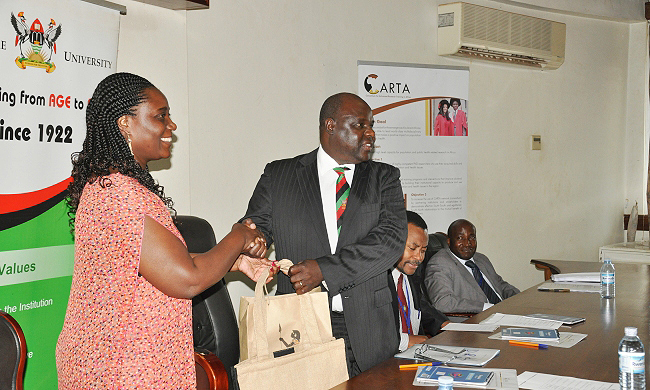Over 100 participants from Universities/institutions in Africa are being trained and equipped with knowledge and skills in research management and governance, supervision and mentoring of graduate students, librarianship and use of information technology tools.
According to Professor Mukadasi Buyinza, the Director Research and Graduate Training (RGT), Makerere University, the three-day Capacity Development Training Workshop for University Faculty and Administrators, which kicked off on 21st July 2014, is aimed at supporting research and postgraduate programmes in African universities.
The Consortium for Advanced Research Training in Africa (CARTA) is a South-South partnership with South-North collaboration. CARTA is jointly-led by the African Population and Health Research Center (APHRC), Kenya and the University of the Witwatersrand (Wits), South Africa. It consists of nine African universities, four African research institutes and seven northern academic institutions.
The participating universities include: Makerere University– Uganda, Moi University and University of Nairobi-Kenya, National University of Rwanda-Rwanda, Obafemi Awolowo University-Nigeria, University of Dar-es-Salaam-Tanzania, University of Ibadan-Nigeria, and University of Witwatersrand-South Africa.
In a speech read by the Deputy Director-Research, RGT, Dr. George William Nasinyama, the Vice Chancellor of Makerere University, Professor John Ddumba-Ssentamu welcomed the delegates and thanked the Consortium for Advanced Research Training in Africa (CARTA) for choosing Makerere University to host the 5th Faculty and Administrators Workshop.
The Vice Chancellor applauded CARTA for undertaking several strategies to promote research in Africa. “I am happy to note that through the CARTA initiative of strengthening doctoral training and supervision and support to the institutional research infrastructure, universities will build high-quality research capacity that will ably address the myriad issues facing Africa,” he remarked.
 The Vice Chancellor urged the participants to live true to the ideals of the CARTA Programme by transferring the same principles to their respective universities and research institutions so as to build a critical mass of researchers.
The Vice Chancellor urged the participants to live true to the ideals of the CARTA Programme by transferring the same principles to their respective universities and research institutions so as to build a critical mass of researchers.
The CARTA Board Chairperson, Professor Akinyinka Omigbodun added that CARTA was committed to building the capacity of existing staff in research management and governance, strengthening the research infrastructure at African universities, and to supporting doctoral training through a model collaborative PhD program in population and public health.
“CARTA’s ultimate goal is to build local research capacity to understand the determinants of health in Africa and develop effective interventions to improve health systems and outcomes. We have supported over 100 post graduate students in research training. We have also trained over 400 academic and administrative staff in member institutions. This year we are going to award 25 full scholarships in research, covering full tuition and a free computer well updated with the necessary software,” said Professor Akinyinka Omigbodun.
Dr. Nasinyama , the Deputy Director Research, RGT reiterated the need to build an enabling environment for research. “If we are to realize the strategic focus of being research driven universities, I encourage every participant to always emphasize the dire need for universities and development partners to invest in research support infrastructures in universities,” he emphasized.
During the Monday 21st July 2014 group discussion, participants were tasked to come up with strategies that would position their respective universities among the top 100 public health institutions in the world. This brainstorming session delivered the ten (10) most critical interventions for raising university research rating/ranking as listed here below:
- Conducting research relevant to the country and world
- Providing incentives within a research structure;
- Training for researchers;
- Undertaking Inter-disciplinary collaboration;
- Global networking with more successful institutions;
- Collaboration with industry;
- Encourage Government to promote research;
- Transitional research;
- Increasing intake of postgraduate students; and
- Dissemination of research findings and outputs
 Facilitating the plenary session, Dr. Joseph Gichuru, Director of Operations, APHRC commended the participants for generating ideas that would enable their respective institutions to be recognised among the top 100 in the world. During his presentation on research management and governance, which focused on the quality of research, funding and power relations, emerging research management structures, Dr. Gichuru emphasized the need to consider the challenges faced by researchers in trying to execute their work globally.
Facilitating the plenary session, Dr. Joseph Gichuru, Director of Operations, APHRC commended the participants for generating ideas that would enable their respective institutions to be recognised among the top 100 in the world. During his presentation on research management and governance, which focused on the quality of research, funding and power relations, emerging research management structures, Dr. Gichuru emphasized the need to consider the challenges faced by researchers in trying to execute their work globally.
“It is after we have known the challenges we face as researchers that we can be able to figure out the best ways on how we can take our countries to the global standard in research,” he said.
Dr. Gichuru pointed out that the issue of plagiarism was the key challenge affecting researchers, in addition to, inadequate resources, failure to accredit our fellow researchers, and inaccurate policies to regulate research structures.
Article by: Ritah Namisango, Public Relations Office
Photos by: Elias Tuhereze, Public Relations Office

 General2 weeks ago
General2 weeks ago
 Agriculture & Environment2 weeks ago
Agriculture & Environment2 weeks ago
 General1 week ago
General1 week ago
 Health2 weeks ago
Health2 weeks ago
 Research2 weeks ago
Research2 weeks ago



